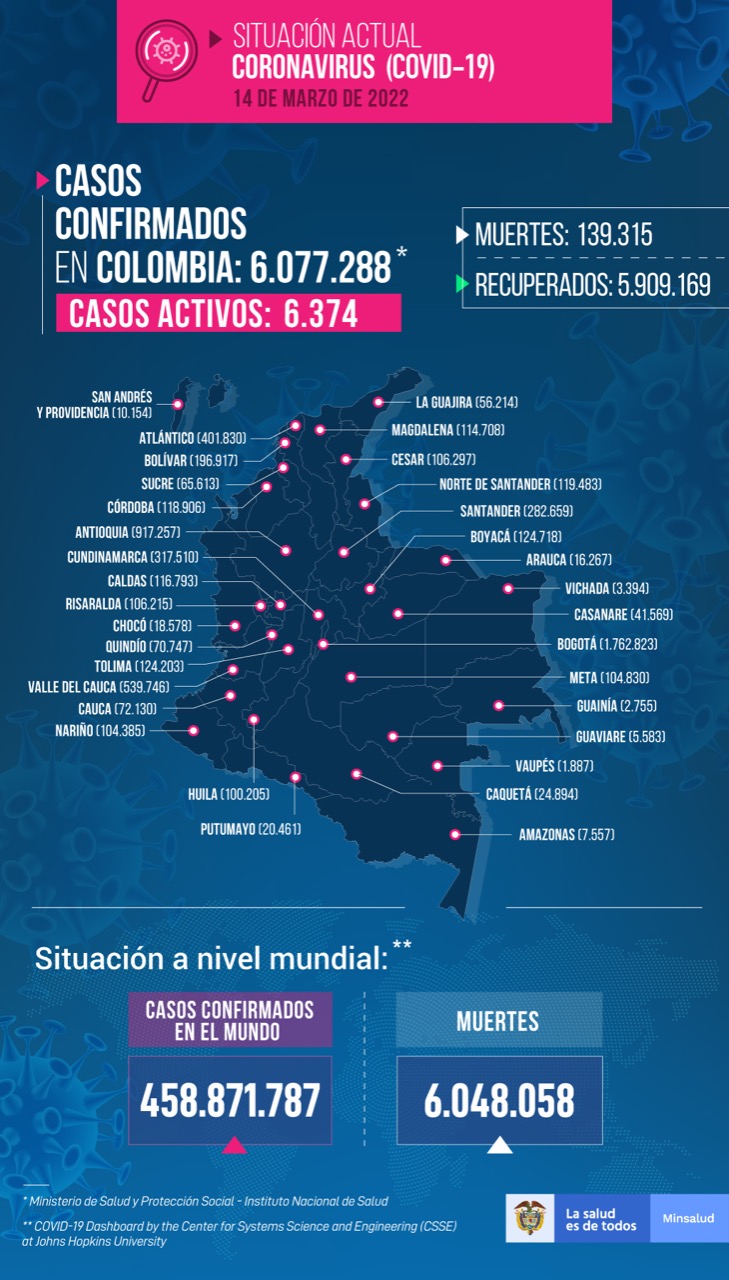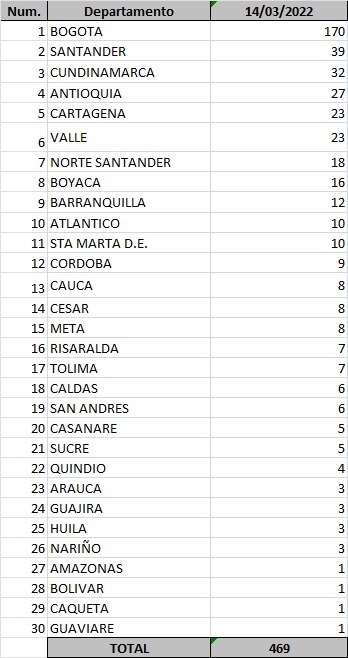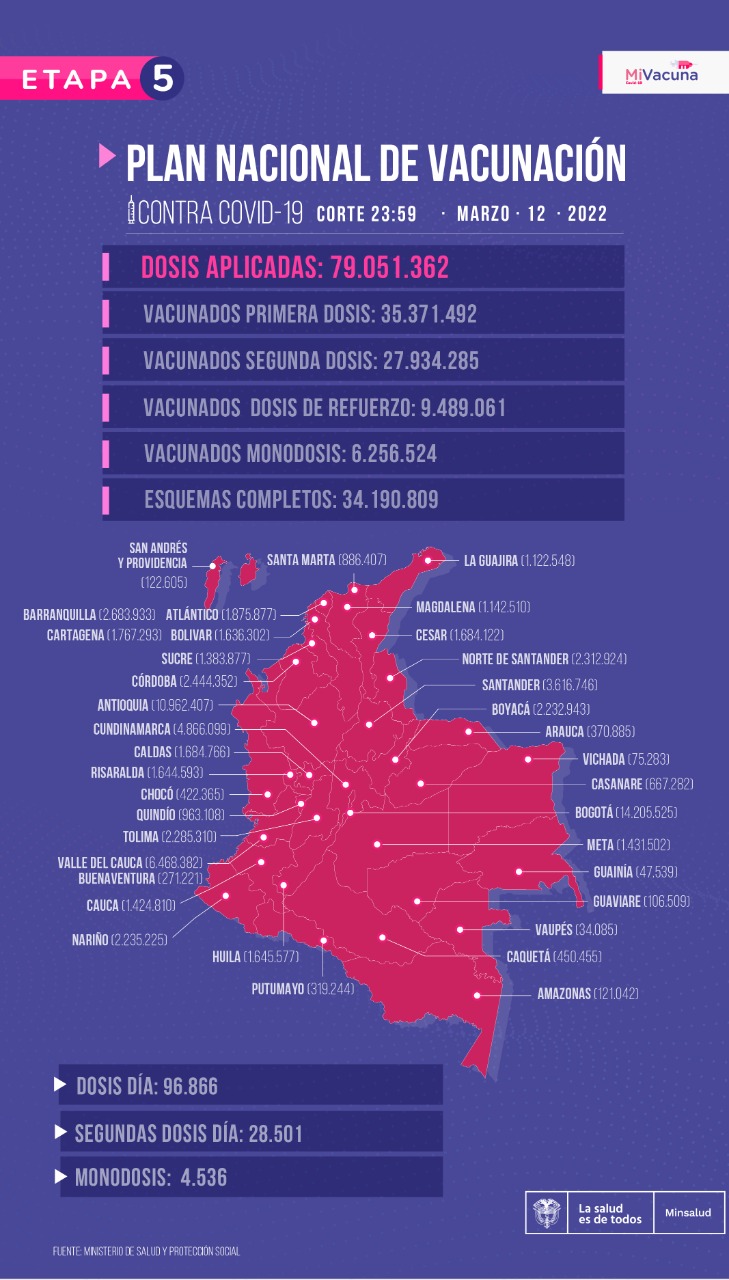
The Ministry of Health reported this Monday, March 14, 2022, 469 new cases of covid-19 in Colombia. In the last 24 hours, 23,331 tests were processed, of which 11,054 are PCR and 12,277 are antigens.
The report also notes that 18 Colombians died of the disease on the last day. In this way, the country reaches a total of 139,315 deaths due to the virus since the start of the pandemic.
By aggregating all the figures, Colombia reached a total of 6,077,288 infections, of which 6,374 are active cases and 5,909,169 correspond to positive cases that have already managed to overcome the disease.

As for the regions with the most reported cases, Bogotá leads with 170 infected, followed by Santander with 39 infections and third Cundinamarca with 32.

There are 211 conglomerates in the country. The territories are: Antioquia, Atlántico, Barranquilla, Bogota, Boyaca, Caldas, Caqueta, Casanare, Cesar, Choco, Cundinamarca, Guainía, Guaviare, Huila, La Guajira, Magdalena, Meta, Nariño, Putumayo, Quindio, Risaralda, Sucre, Valle del Cauca, Vaupes.
This is how vaccination is going in the country
The most recent report from the Ministry of Health also indicates that as of 11:59 on Saturday, March 12, 2022, a total of 79,051,362 doses of the vaccine against covid-19 had already been applied in Colombia

According to the same report, the number of Colombians with the complete vaccination schedule, that is, those who have already received the two doses of the biological, currently amounts to 27,934,285 people, while 6,256,524 people have been immunized with single doses. Likewise, 9,489,061 booster doses have been applied.
Similarly, during the last day, a total of 96,866 vaccines were applied, of which 28,501 were for the second injection, while another 4,536 were single-dose.
The prevalence of dementia syndrome in Latin America and the Caribbean is high. Between 6.0 and 6.5 per 100 adults aged 60 and over develop the disease; and it is estimated that by 2040, growth will be 134% in most countries of the American Southern Cone, surpassing that of any other region of the world.
Faced with this scenario, it is a priority for the Ministry of Health and Social Protection to promote strategies that help reduce their impact in the region, and above all, in the country. There are factors that reduce risk, many of them related to education and healthy habits
Thus, the Ministry of Health and Social Protection recommends that the following habits be put into practice:
Eating well: Reduce fats, especially saturated fats, reduce animal products (meat, dairy, cheese), reduce processed foods, consume more plants of all varieties, especially vegetables and beans, increase consumption of fruits, especially berries, reduce salt intake.
Exercise: regular aerobic exercise, leg strengthening exercises, regular movement throughout the day. regular aerobic exercise, leg strengthening exercises, regular movement throughout the day.
Managing stress: identifying good and bad stress, working to increase good stress (purpose-driven, success-oriented) and reduce bad stress; meditation and mindfulness techniques throughout the day.
Sleep well: Lack of sleep could influence the risk of dementia in several ways. Certain sleep problems such as insomnia can cause swelling in the brain that can lead to dementia. Another cause is that they could reduce the efficiency of metabolism in the brain, such as the ability of the mind to transfer waste through its lymphatic system, which could lead to loss of neural cells.
Optimize mental and social activity: individuals participate in complex tasks (involving multiple cognitive domains of the brain), such as learning musical instruments, learning languages and leading projects; especially the complexity of the work has a greater effect on the construction of the cognitive reserve. Social engagement and having a rich social network have also been associated with a reduced risk of dementia.
KEEP READING:



